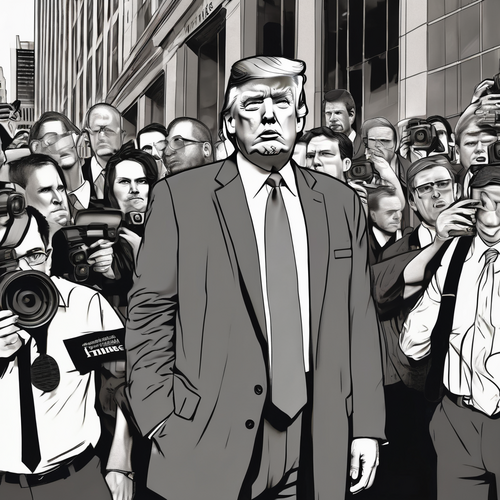President Trump Sues New York Times for Defamation in $15 Billion Case ⚖️📰
In a move as audacious as it is intriguing, former President Donald Trump has launched a $15 billion lawsuit against The New York Times, claiming defamation over reporting that has, in his view, skewed public perception into a decidedly negative light. Yet, in a twist reminiscent of a Shakespearean play, where the hero often becomes his own antagonist, one might question—who, exactly, is being defamed here? 🤔
This latest legal escapade unfolds like an elaborate chess game, with Trump perched as the king, attacking media outlets that scrutinize him—a curious irony, given his own history of labeling critical journalists as “fake news.” The crux of Trump’s argument pivots on two *New York Times* pieces that he asserts mischaracterized his actions and motivations during his presidency. The claim should certainly raise eyebrows; after all, one man’s defamation can often be another’s responsible journalism, much like the contrast between the sun setting and the moon rising—two celestial bodies illuminating the same sky but conveying entirely different narratives.
The Legal Landscape of Defamation
Defamation suits hang precariously on the thread of truth and opinion, a tightrope walk that often reveals the larger societal discourse on free speech. In the United States, for a public figure like Trump to prevail in a defamation case, he must prove “actual malice”—the conscious intent to mislead or harm. A formidable challenge, indeed, akin to chasing shadows in a dimly lit room, as the onus is heavy on him to untangle the motives of seasoned journalists adhering to the first principles of their craft.
As legal experts dissect this ambitious lawsuit, a delightful irony bubbles to the surface: Trump has consistently criticized the press for “spreading lies,” yet here he is, defending his own narrative through the very medium he scorns. In the grand theater of politics, nothing is ever as straightforward as it appears, and this lawsuit may well serve as a double-edged sword—one sharp enough to cut the strings of media freedom if the courtroom turns in his favor.
Implications for Media and Politics
The lawsuit could set a paradoxically chilling precedent, potentially unraveling the fabric of journalistic integrity and the freedom of the press. If courts begin to side with leaders when they claim defamation, it might stifle dissenting voices—an unsettling thought, wouldn’t you agree? Much like silencing the wind when it howls through the trees, restricting the press would silence a vital element of democratic engagement.
Ensnared in this legal battle, the media finds itself at a crossroads. Will it continue illuminating the complexities of political life, or retreat into a shell, fearful of litigation? The stakes are acutely high, akin to walking a tightrope over a pit of jagged rocks. Journalists possess the formidable responsibility of informing the public while navigating the treacherous waters of political repercussions. As Trump’s lawsuit unfurls, the journalistic fraternity finds itself in a suspenseful state, echoing the sentiment of a ship caught in a storm: battling waves of conflict while trying to keep the course steady.
Public Reactions: A Divided Audience
The lawsuit has ignited a firestorm of commentary on social media platforms, with opinions sharply segregated. Trump’s supporters, wielding hashtags like shields, rally behind their leader, praising his audacity to combat perceived media bias. In stark contrast, critics frame the lawsuit as an assault on the pillars of democracy, warning that a victory for Trump could herald an era of increased censorship—a specter that haunts the very essence of American values.
- Supporters’ View: A necessary step to hold the media accountable.
- Critics’ View: A blatant attempt to stifle free speech and dissent.
Both sides frame their arguments as if they were gladiators in an ancient arena, each vying for supremacy while the audience is left to grapple with the unsettling reality: the intricate dance of information and power is anything but simplistic. The world awaits the court’s decision, standing as spectators at an unpredictable theatrical performance where the ultimate verdict could shape the interplay of media and political discourse for years to come.
The Bigger Picture: Democracy at Stake?
Many observers note this lawsuit strikes at the very heart of democracy. As citizens wade through the murky waters of political narratives, the role of credible journalism becomes ever more pivotal. To dismiss concerns over media freedom in pursuit of a personal vendetta is akin to severing the vines that hold up a flourishing vineyard. The fruit—rich with opinion and truth—begins to wither without healthy oversight and accountability.
Even as Trump’s legal team prepares for what promises to be a protracted courtroom battle, the essence of the matter transcends his personal grievances. What does this lawsuit teach us about our commitments to truth-telling, accountability, and the intricate relationship between those in power and the watchdogs meant to keep them honest?
In a world increasingly dominated by partisan echoes, the need for factual reporting and critical discourse remains paramount. Politicians, like Trump, must recognize the responsibility of their actions and words; they are not above public scrutiny, nor should they wield the threat of litigation to silence dissent. As the saga unfolds, one cannot help but wonder if this chapter will become a cautionary tale, urging future leaders to uphold the integrity of democratic principles—or merely another footnote in the annals of political theater. 📚
This lawsuit is not just a legal maneuver; it’s a reflection of our times, challenging us all to consider where we stand on the spectrum of free speech, media responsibility, and the enduring quest for truth in an age where perception often trumps reality.

